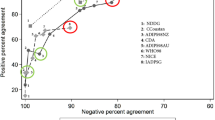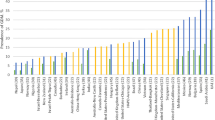Abstract
The International Association of Diabetes in Pregnancy Study Groups (IADPSG) recommended a new protocol of 1-step testing with a 75 g oral glucose tolerance test for gestational diabetes in 2010. Since that time, these recommendations have been carefully scrutinized and accepted by a variety of organizations, but challenged or rejected by others. In the current review, we present more details regarding the background to the development of the IADPSG recommendations and seek to place them in context with the available epidemiologic and randomized controlled trial data. In this “counterpoint,” we also provide specific rebuttal for errors of fact and disputed contentions provided by Long and Cundy in their 2013 article in Current Diabetes Reports.
Similar content being viewed by others
References
Papers of particular interest, published recently, have been highlighted as: • Of importance
Metzger BE, Lowe LP, Dyer AR, Trimble ER, Chaovarindr U, Coustan DR, et al. Hyperglycemia and adverse pregnancy outcomes. N Engl J Med. 2008;358:1991–2002.
Metzger BE, Gabbe SG, Persson B, Buchanan TA, Catalano PA, Damm P, et al. International association of Diabetes and Pregnancy Study Group’s recommendations on the diagnosis and classification of hyperglycemia in pregnancy. Diabetes Care. 2010;33:676–82. This paper presents the recommendations of the IADPSG consensus panel, which form the basis of the current point/counterpoint discussion.
American Diabetes Association. Standards of Medical Care in Diabetes—2013. Diabetes Care. 2013;36 Suppl 1:S11–66.
Blumer I, Hadar E, Hadden DR, Jovanovic L, Mestman JH, Murad MH, et al. Diabetes and pregnancy: an endocrine society clinical practice guideline. J Clin Endocrinol Metab. 2013;98:4227–49.
World Health Organization. Diagnostic Criteria and Classification of Hyperglycaemia First Detected in Pregnancy. Geneva: WHO Press; 2013.
Committee on Practice Bulletins—Obstetrics. Practice Bulletin No. 137: Gestational diabetes mellitus. Obstet Gynecol. 2013;122(2 Pt 1):406–16.
NIH consensus panel. National Institutes of Health consensus development conference statement: diagnosing gestational diabetes mellitus, March 4-6, 2013. Obstet Gynecol. 2013;122(2 Pt 1):358–69.
Canadian Diabetes Association Clinical Practice Guidelines Expert Committee. Canadian Diabetes Association 2013 Clinical Practice Guidelines for the Prevention and Management of Diabetes in Canada. Can J Diabetes. 2013;37 Suppl 1:S1–212.
American Diabetes Association. Standards of medical care in diabetes—2014. Diabetes Care. 2014;37 Suppl 1:S14–80.
Long H, Cundy T. Establishing consensus in the diagnosis of gestational diabetes following HAPO: where do we stand? Curr Diabetes Rep. 2013;13:43–50.
Carrington ER, Shuman CR, Reardon HS. Evaluation of the prediabetic state during pregnancy. Obstet Gynecol. 1957;9:664–9.
O’Sullivan JB. Gestational diabetes. Unsuspected, asymptomatic diabetes in pregnancy. N Engl J Med. 1961;264:1082–5.
O’Sullivan JB, Mahan CM. Criteria for the Oral Glucose Tolerance Test in Pregnancy. Diabetes. 1964;13:278–85.
Flegal KM, Carroll MD, Kit BK, Ogden CL. Prevalence of obesity and trends in the distribution of body mass index among US adults, 1999-2010. JAMA. 2012;307:491–7.
Berggren EK, Boggess KA, Stuebe AM, Jonsson Funk M. National Diabetes Data Group vs Carpenter-Coustan criteria to diagnose gestational diabetes. Am J Obstet Gynecol. 2011;205(253):e1–7.
Naylor CD. Diagnosing gestational diabetes mellitus. Is the gold standard valid? Diabetes Care. 1989;12:565–72.
Cutchie WA, Cheung NW, Simmons D. Comparison of International and New Zealand Guidelines for the care of pregnant women with diabetes. Diabet Med. 2006;23:460–8.
Metzger BE, Contreras M, Sacks DA, Watson W, Dooley SL, Foderaro M, et al. The Hyperglycemia and Adverse Pregnancy Outcome (HAPO) Study. Int J Gynecol Obstet. 2002;78:69–77.
Metzger BE, Persson B, Lowe LP, Dyer AR, Cruickshank JK, Deerochanawong C, et al. Hyperglycemia and adverse pregnancy outcome study: neonatal glycemia. Pediatrics. 2010;126:e1545–52.
Sacks DA, Hadden DR, Maresh M, Deerochanawong C, Dyer AR, Metzger BE, et al. Frequency of gestational diabetes mellitus at collaborating centers based on IADPSG consensus panel-recommended criteria: the Hyperglycemia and Adverse Pregnancy Outcome (HAPO) Study. Diabetes Care. 2012;35:526–8. This paper outlines varying contributions of fasting and postload glucose to the diagnosis of GDM across HAPO collaborating centers.
Catalano PM, McIntyre HD, Cruickshank JK, McCance DR, Dyer AR, Metzger BE, et al. The Hyperglycemia and Adverse Pregnancy Outcome Study: associations of GDM and obesity with pregnancy outcomes. Diabetes Care. 2012;35:780–6. This paper evaluates the relative contributions of GDM and maternal obesity to pregnancy complications in the HAPO study cohort.
HAPO Study Cooperative Research Group. Hyperglycaemia and Adverse Pregnancy Outcome (HAPO) Study: associations with maternal body mass index. BJOG. 2010;117:575–84.
McIntyre HD, Lowe LP, Dyer AR, Metzger BE. Obesity in Pregnancy: data from the HAPO study. In: Ovesen PG, editor. Maternal Obesity and Pregnancy. Berlin: Springer-Verlag; 2012. p. 271–81.
Sobngwi E, Boudou P, Mauvais-Jarvis F, Leblanc H, Velho G, Vexiau P, et al. Effect of a diabetic environment in utero on predisposition to type 2 diabetes. Lancet. 2003;361:1861–5.
Pettitt DJ, Bennett PH, Saad MF, Charles MA, Nelson RG, Knowler WC. Abnormal glucose tolerance during pregnancy in Pima Indian women. Long-term effects on offspring. Diabetes. 1991;40 Suppl 2:126–30.
Sacks DA, Greenspoon JS, Abu-Fadil S, Henry HM, Wolde-Tsadik G, Yao JF. Toward universal criteria for gestational diabetes: the 75-g glucose tolerance test in pregnancy. Am J Obstet Gynecol. 1995;172(2 Pt 1):607–14.
Sermer M, Naylor CD, Gare DJ, Kenshole AB, Ritchie JW, Farine D, et al. Impact of increasing carbohydrate intolerance on maternal-fetal outcomes in 3637 women without gestational diabetes. The Toronto Tri-Hospital Gestational Diabetes Project. Am J Obstet Gynecol. 1995;173:146–56.
Jensen DM, Damm P, Sørensen B, Mølsted-Pedersen L, Westergaard JG, Klebe J, et al. Clinical impact of mild carbohydrate intolerance in pregnancy: a study of 2904 nondiabetic Danish women with risk factors for gestational diabetes mellitus. Am J Obstet Gynecol. 2001;185:413–9.
Schmidt MI, Duncan BB, Reichelt AJ, Branchtein L, Matos MC. Costa e Forti A, et al. Gestational diabetes mellitus diagnosed with a 2-hour 75-g oral glucose tolerance test and adverse pregnancy outcomes. Diabetes Care. 2001;24:1151–5.
Metzger BE. The diagnosis of gestational diabetes mellitus: new paradigms or status quo? J Matern Fetal Neonatal Med. 2012;10:10. This paper provides detailed consideration of alternative diagnostic thresholds for GDM and their effects on risk (hazard) ratios in women affected or unaffected by the diagnosis at varying thresholds.
Crowther CA, Hiller JE, Moss JR, McPhee AJ, Jeffries WS, Robinson JS. Effect of treatment of gestational diabetes mellitus on pregnancy outcomes. N Engl J Med. 2005;352:2477–86.
Landon MB, Spong CY, Thom E, Carpenter MW, Ramin SM, Casey B, et al. A multicenter, randomized trial of treatment for mild gestational diabetes. N Engl J Med. 2009;361:1339–48.
Falavigna M, Schmidt MI, Trujillo J, Alves LF, Wendland ER, Torloni MR, et al. Effectiveness of gestational diabetes treatment: a systematic review with quality of evidence assessment. Diabetes Res Clin Pract. 2012;98:396–405. doi:10.1016/j.diabres.2012.09.002 [Epub Sep 29, 2012].
Lowe LP, Metzger BE, Dyer AR, Lowe J, McCance DR, Lappin TR, et al. Hyperglycemia and Adverse Pregnancy Outcome (HAPO) Study: associations of maternal A1C and glucose with pregnancy outcomes. Diabetes Care. 2012;35:574–80.
van Leeuwen M, Louwerse MD, Opmeer BC, Limpens J, Serlie MJ, Reitsma JB, et al. Glucose challenge test for detecting gestational diabetes mellitus: a systematic review. BJOG. 2012;119:393–401. This systematic review outlines the limitations of the glucose challenge test in the diagnosis of GDM.
Ryan EA. Diagnosing gestational diabetes. Diabetologia. 2011;54:480–6.
Ryan EA. Diagnostic criteria for gestational diabetes: who decides? Can Med Assoc J. 2012
Acknowledgment
Donald R. Coustan has received grant support from NICHD.
Compliance with Ethics Guidelines
ᅟ
Conflict of Interest
H. David McIntyre has board membership with the Mater Research Institute. He has received speakers’ fees from Novo Nordisk, Eli Lilly, Sanofi-Aventis, and AstraZeneca. He has received travel/accommodations expenses covered or reimbursed for travel to meetings from Novo Nordisk, Sanofi-Aventis, and AstraZeneca. Donald R. Coustan has received royalties for textbooks written or edited. He has received honoraria from various academic institutions and professional organizations for lectures given, none from commercial entities. He has received travel expense reimbursement and coverage for giving lectures at various academic institutions and professional organizations, none from commercial entities. He was regional director for North America in the HAPO study. Boyd E. Metzger, Alan R. Dyer, David R. Hadden, Moshe Hod, Lynn P. Lowe, Jeremy J.N, Oats, and Bengt Persson declare that they have no conflict of interest.
Human and Animal Rights and Informed Consent
This article does not contain any studies with human or animal subjects performed by any of the authors.
Author information
Authors and Affiliations
Corresponding author
Additional information
This article is part of the Topical Collection on Diabetes and Pregnancy
Rights and permissions
About this article
Cite this article
McIntyre, H.D., Metzger, B.E., Coustan, D.R. et al. Counterpoint: Establishing Consensus in the Diagnosis of GDM Following the HAPO Study. Curr Diab Rep 14, 497 (2014). https://doi.org/10.1007/s11892-014-0497-x
Published:
DOI: https://doi.org/10.1007/s11892-014-0497-x




